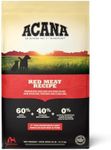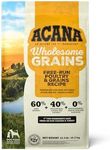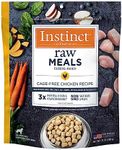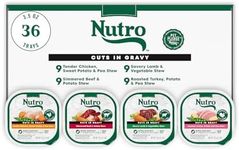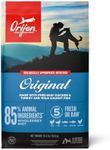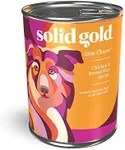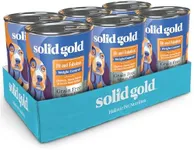Buying Guide for the Best Grain Free Dog Foods
Choosing the right grain-free dog food for your pet is crucial for their health and well-being. Grain-free dog foods are designed to eliminate grains like wheat, corn, and rice from your dog's diet, which can be beneficial for dogs with allergies or sensitivities. When selecting a grain-free dog food, it's important to consider several key specifications to ensure that the food meets your dog's nutritional needs and preferences.Protein SourceProtein is essential for your dog's muscle development and overall health. Grain-free dog foods often use alternative protein sources like chicken, beef, fish, or lamb. Some dogs may have allergies to certain proteins, so it's important to choose a protein source that your dog can tolerate. If your dog is active or a working breed, they may require higher protein content. For less active or older dogs, a moderate protein level may be sufficient.
Carbohydrate SourceEven though grain-free dog foods do not contain grains, they still need a source of carbohydrates for energy. Common carbohydrate sources in grain-free dog foods include sweet potatoes, peas, and lentils. These ingredients provide essential nutrients and fiber. If your dog has a sensitive stomach, you may want to choose a food with easily digestible carbohydrates. For dogs with high energy levels, look for foods with complex carbohydrates that provide sustained energy.
Fat ContentFats are a crucial part of your dog's diet, providing energy and supporting skin and coat health. Grain-free dog foods typically include healthy fats from sources like fish oil, chicken fat, or flaxseed. The fat content can vary, with higher fat levels being suitable for active or working dogs, while lower fat levels may be better for less active or overweight dogs. Always ensure the fat sources are high-quality and provide essential fatty acids.
Vitamins and MineralsVitamins and minerals are essential for your dog's overall health, supporting everything from immune function to bone health. Grain-free dog foods should be fortified with a balanced mix of vitamins and minerals. Look for foods that include a variety of fruits and vegetables, which can provide natural sources of these nutrients. If your dog has specific health concerns, consult with your vet to ensure the food meets their nutritional needs.
DigestibilityDigestibility refers to how easily your dog can break down and absorb the nutrients in their food. High digestibility is important for ensuring your dog gets the most out of their diet. Grain-free dog foods with high-quality ingredients and minimal fillers tend to be more digestible. If your dog has digestive issues, look for foods with probiotics and prebiotics, which can support gut health and improve digestion.
Flavor and PalatabilityFlavor and palatability are important to ensure your dog enjoys their food and eats it consistently. Grain-free dog foods come in various flavors, often influenced by the primary protein source. If your dog is a picky eater, you may need to try a few different flavors to find one they like. Pay attention to your dog's preferences and choose a food that they find appealing and satisfying.

